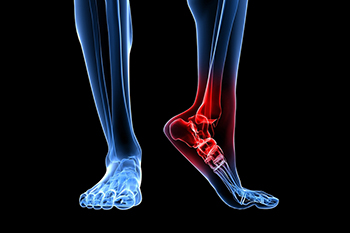

Heel bone fractures, located in the calcaneus bone at the back of the foot, typically result from significant force, such as falling from a great height or a vehicle accident. A heel bone fracture also may be accompanied by injuries to the knees or spine. This type of fracture can cause swelling, tenderness, and an inability to bear weight on the affected foot. Diagnosing a heel fracture generally involves X-rays, although a CT scan might be used for more detailed imaging. Initial treatment includes rest, compression, and elevation, followed by a splint or cast after any exsisting swelling reduces. If the fracture disrupts joint alignment, surgery might be necessary to properly set the bones. Podiatrists are instrumental in diagnosing, treating, and managing rehabilitation for heel fractures. If you are experiencing severe heel pain after a trauma, it is suggested that you schedule an immediate appointment with a podiatrist.
Many people suffer from bouts of heel pain. For more information, contact Dr. Harris L. Klear of Burlington County Podiatry Associates. Our doctor can provide the care you need to keep you pain-free and on your feet.
Causes of Heel Pain
Heel pain is often associated with plantar fasciitis. The plantar fascia is a band of tissues that extends along the bottom of the foot. A rip or tear in this ligament can cause inflammation of the tissue.
Achilles tendonitis is another cause of heel pain. Inflammation of the Achilles tendon will cause pain from fractures and muscle tearing. Lack of flexibility is also another symptom.
Heel spurs are another cause of pain. When the tissues of the plantar fascia undergo a great deal of stress, it can lead to ligament separation from the heel bone, causing heel spurs.
Why Might Heel Pain Occur?
Treatments
Heel pain should be treated as soon as possible for immediate results. Keeping your feet in a stress-free environment will help. If you suffer from Achilles tendonitis or plantar fasciitis, applying ice will reduce the swelling. Stretching before an exercise like running will help the muscles. Using all these tips will help make heel pain a condition of the past.
If you have any questions please contact one of our offices located in Marlton and Delran, NJ . We offer the newest diagnostic and treatment technologies for all your foot and ankle needs.